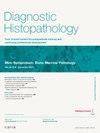肾上腺皮质的分类和分子病理学的最新进展
引用次数: 0
摘要
介绍了肾上腺皮质结节性疾病的新术语。这些疾病包括:散发性结节性、双侧小结节性、双侧大结节性肾上腺皮质疾病和双侧弥漫性肾上腺皮质增生。几个基因(PRKAR1A, PDE11A/8B)与发病机制有关,它们主要影响c-AMP途径。同样,根据HISTALDO分类,产生醛固酮的腺瘤分为:产生醛固酮的腺瘤,大小为1cm,结节大小为1cm,结节大小为1cm,通常为mm,以及癌。醛固酮产生腺瘤的关键基因有:KCNJ5、ATP1A1、CACNA1D和CTNNB1。产生皮质醇的腺瘤主要由PRKACA、GNAS和CTNNB1基因突变引起。P53和CTNNB1是大多数肾上腺皮质癌发生突变的关键基因。本文章由计算机程序翻译,如有差异,请以英文原文为准。
An update on the classification and molecular pathology of the adrenal cortex
New terminology has been introduced for adrenocortical nodular disease. These include: sporadic nodular-, bilateral micronodular-, bilateral macronodular-adrenocortical disease, and bilateral diffuse adrenocortical hyperplasia. Several genes (PRKAR1A, PDE11A/8B) are implicated in the pathogenesis and they principally impact the c-AMP pathway.
Similarly, aldosterone-producing adenomas are classified according to the HISTALDO classification into: aldosterone-producing: adenoma >1 cm, nodule <1 cm, nodule <1 cm and usually mm in size, and carcinoma. The key genes in aldosterone-producing adenomas are: KCNJ5, ATP1A1, CACNA1D and CTNNB1. Cortisol-producing adenomas are principally caused by mutations in PRKACA, GNAS and CTNNB1 genes. P53 and CTNNB1 are the key genes that are mutated in most adrenocortical carcinomas.
求助全文
通过发布文献求助,成功后即可免费获取论文全文。
去求助
来源期刊

Diagnostic Histopathology
Medicine-Pathology and Forensic Medicine
CiteScore
1.30
自引率
0.00%
发文量
64
期刊介绍:
This monthly review journal aims to provide the practising diagnostic pathologist and trainee pathologist with up-to-date reviews on histopathology and cytology and related technical advances. Each issue contains invited articles on a variety of topics from experts in the field and includes a mini-symposium exploring one subject in greater depth. Articles consist of system-based, disease-based reviews and advances in technology. They update the readers on day-to-day diagnostic work and keep them informed of important new developments. An additional feature is the short section devoted to hypotheses; these have been refereed. There is also a correspondence section.
 求助内容:
求助内容: 应助结果提醒方式:
应助结果提醒方式:


